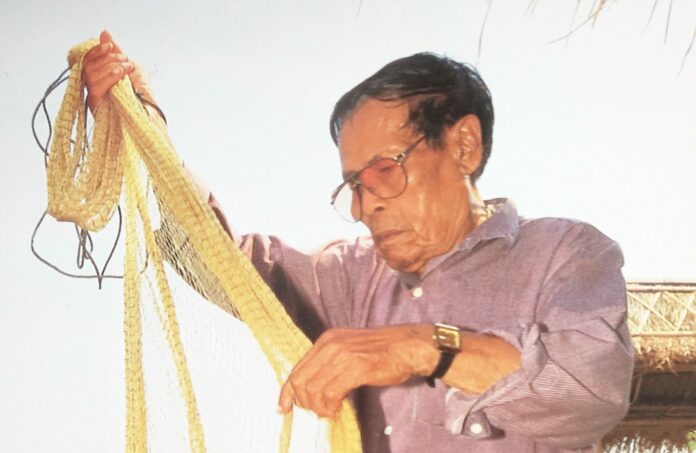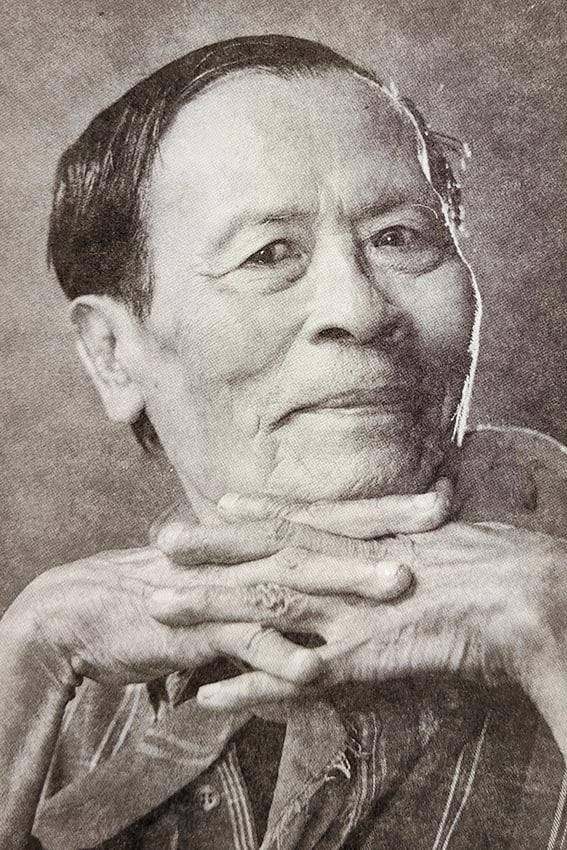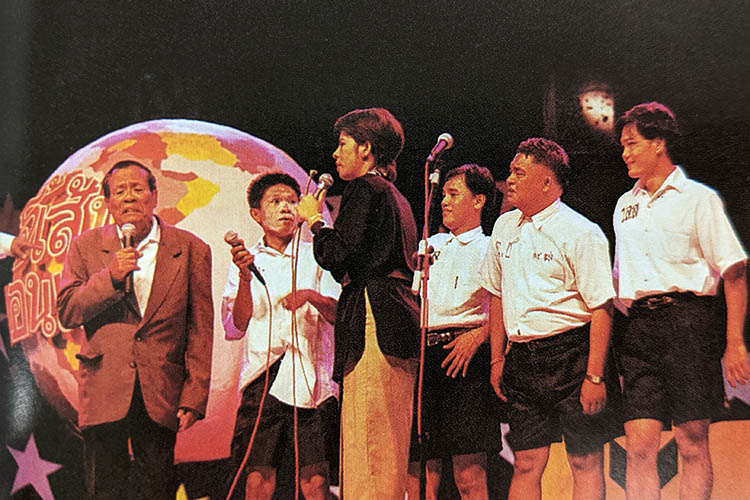Lor Tok – Thailand’s Greatest Comedian of All Time

[photo cr. silpa-mag.com]
Koh Tee, Ped Chernyim, Maam Jokmok, and Kom Chuanchuen are household names of comedians loved and recognized by all Thais, but there is yet another man that even these stellar performers regard as the “father” of the Thai comedy. He had lived through it all – from the era when a comedy troupe had to travel to different venues to give a show, to the movie era, and finally to the television era. This renowned comedian is known by his stage name “Lor Tok.” He was a national performing arts artist. His life was an eventful journey that witnessed wars, changes, and of course, laughter.
“Lor Tok” is the stage name of Mr. Suang Sapsamruai, honored as a national artist (actor-comedian) in 1995. Born in Thonburi, he was a son of durian farmers in the neighborhood of Wat Tha Phra. According to most of the records to date, Lor Tok was born on April 1, 1914, in the reign of King Rama VI. However, the day after Lor Tok’s decease, MRW[1] Thanadsri Sawatdiwat, his childhood friend, spoke on the radio program “Krop Chakkrawan” (All across the Universe) that he remembered vividly that Lor Tok was born on the same day as His Royal Highness Prince Anusorn Mongkolkarn on April 1, 1915. Taking this discrepancy into consideration, it can be generally said that Lor Tok was born between 1914 and 1915, and this was the beginning of the century of “Lor Tok.”
The childhood of Suang[2] was no different from that of any other farmer boy at that time. He had to alternate between helping with his family’s business and going to school to complete mandatory education. Lor Tok graduated with a degree equivalent to Grade 7 of secondary school according to the current Thai education curriculum. His “gift” as a comedian was radiating since a young age. He said, “When I was a kid, I liked to tell jokes… My father always told me to stop and asked if I was serious about being a comedian. (I just thought) it was fun.”
This durian farmer boy had opportunities to be apprenticed by renowned artists of the era, including painter Hem Vejakorn and writers “Mai Muang Derm” (Kan Phuengboon Na Ayutthaya) and Manat Chanyong. Working closely with these maestros, he absorbed the art of writing and painting, which would be of great benefit later on in his journey.
After leaving school, he spent several years of his teenage life with friends in other provinces. He earned a living by riding a tricycle taxi and, from time to time, by boxing at temple fairs. Later, he was drafted into the air force. Shortly after being discharged, he was reinstated to serve in the “Indochina Dispute” between Thailand and France.
Impressed by his comedic skills, his former superior Air Chief Marshal Srisak Sucharittham said about Suang, “He is a promising artist and actor. He can always make people laugh with his words, gestures, and performances. He gives excellent likay[3] solos. He sings, dances and imitates all kinds of music sounds.”
After his service was over, Suang and friends formed the “Mek Dam Troupe” (meaning “dark cloud”) to compete in skit contests at temple fairs. Suang was given the stage name “Lor Tok” when he joined the “Look Thai Troupe” (meaning “Thai descendants”).
 [photo cr. thenormalhero.cr]
[photo cr. thenormalhero.cr]
Initially, Jok Dokchan (Sak Sarakiboot), the head of the Look Thai Troupe named him “Mr. Tuek Sikatorn.” Later, he starred in the drama “When you have the salt, take that salt.”[4] with Obe Boontid, a senior comedian, who played Boss Huan Guo while Suang played another boss with no specific name in the story. Obe then named Suang’s character “Sia Lor Tok,” which has a humorous and ironic denotation because “Sia” is a title of a wealthy Chinese man, yet “Lor Tok” is a children’s play involving tossing coins and winning pennies.
This role was such a great success that from then on Suang became known as “Sia Lor Tok.” It was said that for comedians at that time, “Sia Lor Tok” was an intimidating and formidable name. Wherever the Look Thai Troupe performed, they always attracted a crowd.” Even after Suang parted way with Look Thai for a new team, the name “Lor Tok” remained with him for the rest of his life.
During World War II, also known as the “Greater East Asia War” from 1941-1945, it was not possible to screen movies from Europe and America due to the tense political situation. Many movie theaters were transformed into stages for comedy troupes and bands with intermissions, such as dances and skits. This era saw the emergences of many legendary artists, such as music maestro Eua Sunthornsanan, senior actor and director Supan Buranapim, as well as famous comedian Lor Tok, as Arjin Panchaphan said
“These people appear on the stage under the spotlight. Throughout the war, they cater to the people happiness and entertainment through comedy and music against the backdrop of broken families, collapsing buildings, nights of blazing fire, death, and darkness of the war.”
Sa-nga Arampi, national artist of performing arts and modern Thai music, recounted what it was like during the golden era of the Thai comedy in the midst of the war.
“From time to time, planes would drop bombs. Both the performers and the audience had to run and seek shelter. One time, while performing in a Hawaiian costume, Lor Tok suddenly had to take refuge at the Wat Suthat temple. When the alarm quieted down, some of the viewers who took shelter together with him laughed merrily, including Lo Tok himself. He laughed for that fact that even the character he played was also scared.”
After the war ended in 1945, the film business gradually recovered and regained popularity, stage actors returning to the silver screen. As the wind of change was blowing, Lor Tok made an appearance in the film industry and achieved immense success as a comedian. An excerpt from the National Movie Encyclopedia Volume 1 states that Lor Tok appeared in over fifty 16mm films from 1947-1957. Shortly after came the era of television, commonly known as “TV”.

[photo cr. thenormalhero.co]
The television industry in Thailand began when “Channel 4 Bang Khun Phrom” was launched in 1955 and saw a surge in popularity during 1957 when more television channels were established in parallel with the emergence of local stations in the regions. Another enabling factor was the lower price of television sets. When it came to the TV era, “Lor Tok” made appearances as a game show co-host and a comedian, leaving behind pieces of memories that many Thais hold dear to their hearts even today.
With his accumulated work, reputation and merit, in 1995, the government honored Lor Tok, whose real name was Sergeant Major Suang Sapsamruai, as a national performing arts artist.
Lok Tok passed away on April 30, 2002 at the age of 88 (if we take 1914 as his birth year). Up to now, young generation comedians still respect and worship Lor Tok or “Papa Lor Tok” as their comedian teacher. On his centenary, “Ped Chernyim”, one of the famous comedians today, praised “Papa Lor Tok” whom he referred to as “father”
“When our father was here, we always took care of him. Until today, younger generations of comedians pay homage to him to remember our great teacher every time before we perform.”
The story of Lor Tok reflects the spirit of the Thais who can remain gentle, lively and humorous even in the face of adversity. When the tide is turning, we are ready to accept the new reality, adapt with it and create from it.
[1] M.R.W. (Momratchawongse) is a Thai aristocratic title equivalent to “Sir” or “Lady”.
[2] From this point onward, Mr. Suang Sapsamruai will be referred to as Suang. In the Thai culture, we always address the other person with his or her first name.
[3] Likay is a Thai folk musical performance accompanied by a live Thai music band. The stories are usually based on Thai folk tales and legends in Buddhism. Performers are dressed in lavishly decorated Thai costumes.
[4] “Discard the salt you have for alkali.” is a Thai proverb that describes people who are not aware of the value of what they already have and strive for something else less.
Reference
ทองปาน, ศรัณย์ (Tongpan, Sarun). “หนึ่งศตวรรษ ‘ล้อต๊อก’ สวง ทรัพย์สำรวย (A Century of ‘Lor-Tok’ Suang Sapsamruay).” Watthanatham Journal: Department of Cultural Promotion, yr. 54, no. 1, January – March. 2015, pp. 80 – 85. Retrieved April 1, 2021.
Link: http://magazine.culture.go.th/2015/1/mobile/index.html#p=82__


